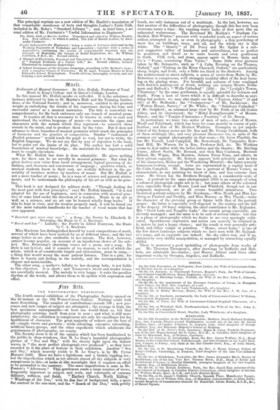Rudiments of Musical Grammar. By John Hullah, Professor of Vocal Music in King's College and in Queen's College, London.
In this manual Mr. Hullah speaks ex cathedra. It is the substance of lectures delivered by him in St. Martin's Hall and the Training Institutions of the National Society ; and is, moreover, entitled to the greatest weight as embodying the results of his experience during his long and successful career as a musical instructor. The title is somewhat too comprehensive, for the book embraces only one branch of musical grammar. It teaches all that is necessary to be known in order to read and understand the written language of music—to associate the signs and characters with the sounds which they represent—to conceive those sounds in the mind, and to produce them by the voice. But it does not advance to those branches of musical grammar which teach the principles of harmony and the practice of composition. Similar "rudiments of _English grammar" would teach the pupil to read, but not to write, the English language. We do not say this by way of objection to the book, but to point out the limits of its plan. The author has laid a solid foundation of musical knowledge ; the materials for the superstructure must be sought elsewhere.
What Mr. Ibillah has done is done admirably. He gives nothing new, for there can be no novelty in musical grammar. But what he gives derives new value from lucid arrangement, logical precision of definition, and clearness and conciseness of language ; qualities which, as musical students know to their cost, are wofully deficient in the generality of treatises written by teachers of music. But Mr. Ilullah is not a mere teacher of music ; he is a man of science and general attainments, and he understands the philosophy of his art as well as its practice.
This book is not designed for solitary study. "Though dealing for the most part with first principles," says Mr. Hullah himself, "it is not adapted for the use of beginners, save in connexion with musical practice of some kind under the direction of a teacher. Music is an art as well as a science, and no art can be learned wholly from books." If this be kept in view, and the treatise properly used, it will be found one of the most valuable handbooks for the teacher of vocal music that has ever appeared.
" Sweetest eyes were ever seen" : a Song; the Poetry by Elizabeth. B. Browning, the Music by C. A. Macirone. " Sweet and low" : Lullaby ; the Poetry by Alfred Tennyson, the Music by C. A. Macuene.
Miss Macirone has distinguished herself by vocal compositions of merit, several of which have been noticed by us at different times ; and the two songs before us are also creditable to her talents. The first, however, cannot become popular, on account of an injudicious choice of the subject. Mrs. Browning's charming verses are a poem, not a song. Its style is not lyrical; and it consists of ten stanzas, to each of which the music, which is of considerable length and elaboration, must be sung,— a thing that would weary the most patient listener. This is a pity, for there is beauty and feeling in the melody, and the accompaniment is elegant and musicianlike.
The other song, a mother's lullaby to her sleeping babe, is not liable to this objection. It is short; and Tennyson's sweet and tender verses run essentially musical. The melody is very happy : it suits the peculiar rhythm of the words, and allows them to be spoken with expression and. effect.




























 Previous page
Previous page